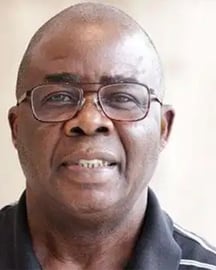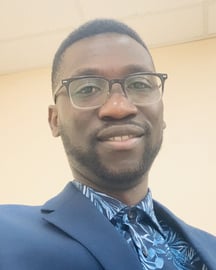- About
- Academics
- Admissions & Aid
- Life
- Research
- News & Events
- Inauguration & Founder's Week
Program at a Glance
Get ready to lead the citizenry.
Department
Learn More
Students study systems of government, political theory, and the intersection of politics with race and culture. Students learn to analyze local, national, and international government systems and prepare to become engaged and active citizens.
Bachelor of Arts in Political Science
Learn More
To graduate with a major in political science, a student must complete 43 credit hours distributed as follows. Students must earn a grade of C or better for all major courses.
Minor in Political Science
Learn More
Students electing to minor in political science must complete 18 hours in the discipline with no grade less than C.
CROWN FORUM:
Asst. Professor of Political Science Adrienne Jones leads discussion with former Secretary of Homeland Security Jeh Johnson ’79
About Political Science
-
Overview
POLITICAL SCIENCE PROMOTES THE UNDERSTANDING OF POLITICS.
Students study systems of government, political theory, and the intersection of politics with race and culture. Students learn to analyze local, national, and international government systems and prepare to become engaged and active citizens.
Outcomes
Students who major in political science prepare for an array of career paths in government, law, business, public service, and more.
The primary goal of the program is to prepare students for the successful entry and completion of graduate and professional schools, especially law school. The second goal of the program is to prepare students for entry-level professional employment in public agencies at all levels—international, national, state, and local. The program’s primary strategic objective is to increase the number of students who attend and graduate from professional and graduate schools.
-
Earn the Major
Curriculum
Major Course of Study Requirements
To graduate with a major in political science, a student must complete 43 credit hours distributed as follows. Students must earn a grade of C or better for all major courses. The core consists of HPSC 228 Comparative Politics, HPSC 251 National Government of the United States, HPSC 253 Scope and Methods in Political Science, HPSC 253L Scope and Methods Data Lab, HPSC 285 Introduction to International Relations, HPSC 294 Introduction to Political Theory, HPSC 348 American Constitutional Law, HPSC 497 Senior Seminar in Political Science, HECO 201 Macroeconomics and HECO 202 Microeconomics. In addition, there are 12 hours of electives and three hours of a special skills course that are required for completion of the major.
General Education (Core)
33-48 hoursRefer to the general education requirements for more information.
Political Science Major
42 hoursCore Curriculum
- HPSC 228—
Comparative Politics - HPSC 251— National Government of the United States
- HPSC 253— Scope and Methods in Political Science
- HPSC 253L— Scope and Methods Data Lab
- HPSC 285— Introduction to International Relations
- HPSC 294— Introduction to Political Theory
- HPSC 348— American Constitutional Law
- HPSC 497— Senior Seminar in Political Science
Cognate Courses
- HECO 201— Macroeconomics
- HECO 202— Microeconomics
Special Skills Requirement (choose one course)
- HCOM 253— Public Speaking
- HCOM 351— Professional Communication
- HCOM 352— Communication in Small Groups and Teams
- HCOM 354— Intercultural Communication
- HCOM 355— Argumentation and Debate
Approved Electives
Each student is required to choose four upper-level courses. These courses can come from any subject area: American government and politics, comparative politics, international relations, and political theory. Students may take only one of these four courses outside of the department—whether through cross-registration, study abroad, or transfer. Directed study and internships do not count as one of these courses. HPSC 351— Introduction to Moot Court does count as one of these courses. HPSC 354— Moot Court Skills Practicum does not count as one of these courses.
American Government and Politics
- HPSC 321— The American Presidency
- HPSC 322— The American Congress
- HPSC 350— Race and Law
- HPSC 351— Introduction to Moot Court
- HPSC 371— Introduction to Public Management
- HPSC 372— Urban Management and Policy Analysis
- HPSC 410— Political Parties, Elections, and Interest Groups
- HPSC 411— Financial Management in Local Government
- HPSC 429— Seminar in Policy and Urban Politics
- HPSC 460— Black Politics
Comparative Politics
- HPSC 302— Third World Politics
- HPSC 475— Latin American Politics
- HPSC 476— Political Anthropology
- HPSC 477— Contemporary African Politics
- HPSC 486— Political Ideologies
International Relations
- HPSC 385— Theories of International Relations
- HPSC 468— Seminar on International Security after the Cold War
- HPSC 479— Comparative Foreign Policy
- HPSC 482— International Ethics
- HPSC 484— International Law
- HPSC 487— International Organizations
- HPSC 488— International Political Economy
- HPSC 489— Problems of International Politics
- HPSC 490— Conflict and Conflict Resolution
- HPSC 491— Diplomacy
Political Theory
- HPSC 361— Ethics and Public Policy
- HPSC 461— History of Political Thought
- HPSC 462— Modern Political Theory
- HPSC 463— Contemporary Theories of Justice
- HPSC 464— Black Political Thought
- HPSC 482— International Ethics
- HPSC 486— Political Ideologies
- HPSC 228—
-
Earn the Minor
Curriculum
MINOR IN POLITICAL SCIENCE
Students electing to minor in political science must complete 18 hours in the discipline with no grade less than C. The following courses constitute the minor:
- PSC 228— Comparative Politics
- PSC 251— National Government of the United States
- PSC 253— Scope and Methods in Political Science
- PSC 285— Introduction to International Relations
- PSC 294— Introduction to Political Theory
- One elective course in political science
POLITICAL SCIENCE PROMOTES THE UNDERSTANDING OF POLITICS.
Students study systems of government, political theory, and the intersection of politics with race and culture. Students learn to analyze local, national, and international government systems and prepare to become engaged and active citizens.
Outcomes
Students who major in political science prepare for an array of career paths in government, law, business, public service, and more.
The primary goal of the program is to prepare students for the successful entry and completion of graduate and professional schools, especially law school. The second goal of the program is to prepare students for entry-level professional employment in public agencies at all levels—international, national, state, and local. The program’s primary strategic objective is to increase the number of students who attend and graduate from professional and graduate schools.
Curriculum
Major Course of Study Requirements
To graduate with a major in political science, a student must complete 43 credit hours distributed as follows. Students must earn a grade of C or better for all major courses. The core consists of HPSC 228 Comparative Politics, HPSC 251 National Government of the United States, HPSC 253 Scope and Methods in Political Science, HPSC 253L Scope and Methods Data Lab, HPSC 285 Introduction to International Relations, HPSC 294 Introduction to Political Theory, HPSC 348 American Constitutional Law, HPSC 497 Senior Seminar in Political Science, HECO 201 Macroeconomics and HECO 202 Microeconomics. In addition, there are 12 hours of electives and three hours of a special skills course that are required for completion of the major.
General Education (Core)
33-48 hours
Refer to the general education requirements for more information.
Political Science Major
42 hours
Core Curriculum
- HPSC 228—
Comparative Politics - HPSC 251— National Government of the United States
- HPSC 253— Scope and Methods in Political Science
- HPSC 253L— Scope and Methods Data Lab
- HPSC 285— Introduction to International Relations
- HPSC 294— Introduction to Political Theory
- HPSC 348— American Constitutional Law
- HPSC 497— Senior Seminar in Political Science
Cognate Courses
- HECO 201— Macroeconomics
- HECO 202— Microeconomics
Special Skills Requirement (choose one course)
- HCOM 253— Public Speaking
- HCOM 351— Professional Communication
- HCOM 352— Communication in Small Groups and Teams
- HCOM 354— Intercultural Communication
- HCOM 355— Argumentation and Debate
Approved Electives
Each student is required to choose four upper-level courses. These courses can come from any subject area: American government and politics, comparative politics, international relations, and political theory. Students may take only one of these four courses outside of the department—whether through cross-registration, study abroad, or transfer. Directed study and internships do not count as one of these courses. HPSC 351— Introduction to Moot Court does count as one of these courses. HPSC 354— Moot Court Skills Practicum does not count as one of these courses.
American Government and Politics
- HPSC 321— The American Presidency
- HPSC 322— The American Congress
- HPSC 350— Race and Law
- HPSC 351— Introduction to Moot Court
- HPSC 371— Introduction to Public Management
- HPSC 372— Urban Management and Policy Analysis
- HPSC 410— Political Parties, Elections, and Interest Groups
- HPSC 411— Financial Management in Local Government
- HPSC 429— Seminar in Policy and Urban Politics
- HPSC 460— Black Politics
Comparative Politics
- HPSC 302— Third World Politics
- HPSC 475— Latin American Politics
- HPSC 476— Political Anthropology
- HPSC 477— Contemporary African Politics
- HPSC 486— Political Ideologies
International Relations
- HPSC 385— Theories of International Relations
- HPSC 468— Seminar on International Security after the Cold War
- HPSC 479— Comparative Foreign Policy
- HPSC 482— International Ethics
- HPSC 484— International Law
- HPSC 487— International Organizations
- HPSC 488— International Political Economy
- HPSC 489— Problems of International Politics
- HPSC 490— Conflict and Conflict Resolution
- HPSC 491— Diplomacy
Political Theory
- HPSC 361— Ethics and Public Policy
- HPSC 461— History of Political Thought
- HPSC 462— Modern Political Theory
- HPSC 463— Contemporary Theories of Justice
- HPSC 464— Black Political Thought
- HPSC 482— International Ethics
- HPSC 486— Political Ideologies
Curriculum
MINOR IN POLITICAL SCIENCE
Students electing to minor in political science must complete 18 hours in the discipline with no grade less than C. The following courses constitute the minor:
- PSC 228— Comparative Politics
- PSC 251— National Government of the United States
- PSC 253— Scope and Methods in Political Science
- PSC 285— Introduction to International Relations
- PSC 294— Introduction to Political Theory
- One elective course in political science
Thought Leadership
On Topic: Immigration Policy is Discussed by associate professor of political science Dr. Matthew Platt ’03
Dr. Matthew Platt ‘03, explains the public health emergency border policy known as “Title 42” and how its upcoming expiration will impact immigration at the U.S.-Mexico border considering the current ...
Dr. M. Adrienne Jones: On Topic – Elections in Georgia
Pre-law Director Dr. M. Adrienne Jones discusses the importance of the highly competitive Georgia state elections that will directly impact decisions made at the federal level, including the ...
The Morehouse-Spelman Pre-Law Society present Real Talk with 2021 Atlanta Primary candidates
The Morehouse-Spelman Pre-Law Society and the Alpha Rho Chapter of Alpha Phi Alpha Fraternity, Inc. present Real Talk with 2021 Atlanta Primary candidates Andre Dickens, Felicia Moore, Dr. John Eaves ...
MEET OUR FACULTY & STAFF
The Political Science department is located in Wheeler Hall, 319.
Andrew Douglas, Department Chair
Cordney Smith, Sr Admin Support Specialist • Div. of Humanities

Ebenezer Aka
Professor

Andrew J. Douglas
Professor/Department Chair

Hye Ryeon "Helen" Jang
Assistant Professor

Winfield Murray
Instructor
Director, Morehouse Moot Court Program
Director, Morehouse Moot Court Program

Maxwell Nimako
Assistant Professor

Matthew Platt
Associate Professor
